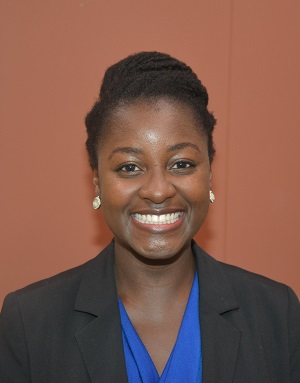The Force of the GEDI
There’s a GEDI at the Wisconsin Center for Education Research.
October 31, 2016 | By Paul Baker

Tenah Hunt is a scientist and a teacher who values knowledge, wisdom and serving others.
Like any Jedi, Tenah Hunt is a scientist and a teacher who values knowledge, wisdom and serving others. She does not, however, carry a light saber.
Hunt is, in fact, a graduate student and intern with WCER’s LEAD Center. Her 10-month appointment is part of the national Graduate Education Diversity Internship (GEDI) Program, which provides internship and training opportunities for students from groups traditionally underrepresented in the field of evaluation. The American Evaluation Association sponsors the program nationwide and the LEAD Center was accepted as a host site.
Hunt is one of a cohort of 15 GEDIs nationwide. Already familiar with campus as a doctoral student in social welfare, she brings to the LEAD Center a long history of working to improve the well-being of vulnerable children and families.
“I am fortunate to have this opportunity to gain experience at WCER because I hope to eventually work for a research center,” she says.
Christine Pribbenow, who directs the LEAD Center, is thrilled that Tenah is interning and part of the GEDI program. “Evaluation is a wonderful profession, and to support and mentor new scholars into this career path is very fulfilling. Because she is involved in the AEA (American Evaluation Association) and is receiving professional development, we hope to learn as much from her as she learns from us.”
Hunt is leading a mixed-methods evaluation of UW-Madison’s McNair Scholars Program. The McNair program prepares traditionally underrepresented undergraduate students for doctoral studies through involvement in research and other scholarly activities. It’s funded at 151 institutions across the U.S. and Puerto Rico by the U.S. Department of Education.
“I’m interviewing campus stakeholders about the success of the McNair program in terms of recruiting, retention and other measurables,” she says. Her goal is to help the program increase the number of underrepresented students entering as undergrads and continuing through a Ph.D. program.
A California native, Hunt has a B.A. in Human Biology from Stanford University and a M.S in Public Health from the University of Michigan. She has researched treatments for pediatric bipolar disorder, evaluated the fidelity of a program designed to improve the relationship between African American non-resident fathers and their sons, and interned at an advocacy organization that aimed to reduce racial disparities in Wisconsin.


